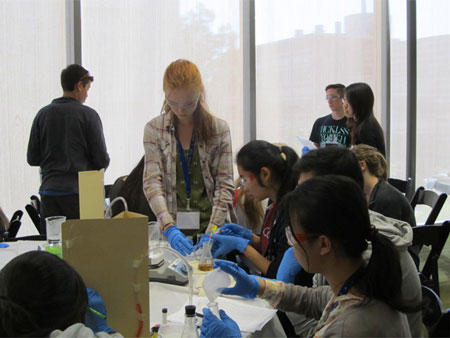| Posted: Jun 21, 2016 | |
Nanotechnology education for the leaders of tomorrow |
|
| (Nanowerk Spotlight) As the leading nanotechnology portal, for the past 10 years, Nanowerk has been committed to educate, inform and inspire about nanotechnologies. We do this by connecting the nanotechnology and nanoscience community to companies and the general public: | |
|
|
|
| So it was nice to see a recent Focus article in ACS Nano ("Nanotechnology Education for the Global World: Training the Leaders of Tomorrow") where the authors discuss current approaches to nanoscience training and propose a learning design framework to promote the next generation of nanoscientists. | |
| As the authors write, "Education has long been recognized as an important factor for growing the fields of nanoscience and nanotechnology and solidifying and expanding their roles in the global economy. In many countries, there is growing interest in developing educational programs across the full spectrum of educational levels from K-12 to postgraduate studies. Various formal and informal educational practices are being designed and tested that promote general awareness of nanoscience and nanotechnology as well as provide advanced learning and skills development, including through group learning and peer assessment." | |
| In their article, the authors discuss innovative learning models that are being applied at the undergraduate level in order to train future leaders at the interface of engineering and management. | |
 |
|
| Middle and high school students spend time at the California NanoSystems Institute at UCLA running nanoscience experiments. High school teachers from over 100 schools and 30 school districts are trained, networked to one another, and supplied with kits for their classrooms. Graduate students, postdocs, faculty, and staff run, expand, and improve these fully subscribed outreach events on a continuous basis. (© American Chemical Society) | |
| While these programs are not strictly focused on nanotechnology, many graduates pursue nanotechnology-focused careers and they provide examples of important factors that should be considered in the nanotechnology field. | |
| Moreover, they represent the growing trend of holistic learning, which integrates coursework across disciplines, promotes foreign experiences, and encourages industrial internships. | |
| Here is the set of recommendations they make: | |
| Inspire Students To Envision What Is or Could Be Possible | |
| Possibilities include a greater focus on nanotechnology applications in courses or hands-on laboratory experiences that tie in with class concepts. Even before reaching the classroom, students should have positive views of nanoscience and the potential it holds. Successful learning practices start with capturing the imagination of students. Communicating the remarkable features of nanoscience in a simple and clear way to the mainstream public would go a long way toward achieving this goal. | |
| Promote Role Models Who Impact Society | |
| From an educational perspective, the tech world is a particularly good example because successful entrepreneurs such as Steve Jobs, Elon Musk, Sheryl Sandberg, and Mark Zuckerberg have captured the public audience and inspired countless students to think beyond the classroom. In nanotechnology, similar role models can inspire students with the many opportunities available in the field. | |
| Encourage Global Collaboration | |
| Nanotechnology research and development is truly global. Early exposure to these trends will better inform students about career opportunities and give them ideas about how to work together in teams across disciplines and cultures. A growing number of partnerships already provide international experiences for nanoscience and nanotechnology students. | |
| Support Early Exposure Inside and Outside of the Laboratory | |
| For many students, nanoscience and nanotechnology are about working in a lab doing scientific research. While this activity is common, its generalization could not be farther from the truth. There are many possible ways to get involved in nanotechnology, from instructional education and hands-on training to entrepreneurship and manufacturing. | |
| Holistic approaches that integrate these different possibilities, while providing targeted career development, would greatly benefit students and the overall goals of nanotechnology education. Developing a strong workforce infrastructure for nanotechnology | |
| Communication Across Fields | |
| Stressing the importance of communication, the authors conclude: "Finally, one of the great strengths of the nanoscience and nanotechnology communities is that we have taught each other how to communicate across fields, to look at and to leverage each other's approaches, and to address the key issues of a multitude of fields. As a field, we are increasingly viewed as problem solvers in science and technology, developing new tools, materials, methods, and opportunities. Bringing this aspect of our field to students (and scientists and engineers at all levels) will have significant impact on the world around us and our ability to make it better." | |
 By
Michael
Berger
– Michael is author of three books by the Royal Society of Chemistry:
Nano-Society: Pushing the Boundaries of Technology,
Nanotechnology: The Future is Tiny, and
Nanoengineering: The Skills and Tools Making Technology Invisible
Copyright ©
Nanowerk LLC
By
Michael
Berger
– Michael is author of three books by the Royal Society of Chemistry:
Nano-Society: Pushing the Boundaries of Technology,
Nanotechnology: The Future is Tiny, and
Nanoengineering: The Skills and Tools Making Technology Invisible
Copyright ©
Nanowerk LLC
|
|
|
Become a Spotlight guest author! Join our large and growing group of guest contributors. Have you just published a scientific paper or have other exciting developments to share with the nanotechnology community? Here is how to publish on nanowerk.com. |
|
